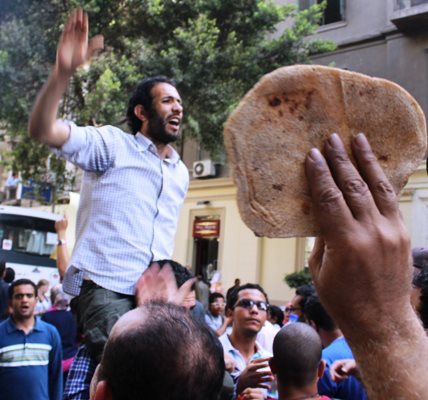Latest NEWS
- Aswat Masriya, the last word
- Roundup of Egypt's press headlines on March 15, 2017
- Roundup of Egypt's press headlines on March 14, 2017
- Former Egyptian President Hosni Mubarak to be released: lawyer
- Roundup of Egypt's press headlines on March 13, 2017
- Egypt's capital set to grow by half a million in 2017
- Egypt's wheat reserves to double with start of harvest -supply min
- Roundup of Egypt's press headlines on March 12, 2017
Update: Egypt seeks to increase $4.8 bln IMF loan - minister

Tens gathered in Cairo on Wednesday to protest an IMF loan Egypt says needs to save its ailing economy that has suffered since a 2011 uprising toppled autocrat Hosni Mubarak. Ahmed Hamed/Aswat Masriya
By Asma Alsharif
CAIRO, April 7 (Reuters) - Egypt is seeking to increase its previously-requested $4.8 billion loan from the International Monetary Fund to cover its soaring budget deficit, the planning minister said in comments carried by three newspapers on Sunday.
"Egypt will intensify its efforts in the spring meetings of the IMF in the period from April 16-21 to receive additional funding to cover the financing deficit until mid-2015," Ashraf El-Araby said in remarks carried by Al Masry Al Youm newspaper.
An IMF delegation is in Cairo for loan talks and Araby is one of the ministers involved in the negotiations.
"There are ongoing discussions to increase the loan, estimated at $4.8 billion but it may rise, especially with the increase in the budget deficit to $20 billion," he was quoted as saying. He gave no new figure and said the talks were not easy.
The minister told Al-Mal financial daily that if a deal is not reached before May, talks will be postponed until October when parliamentary elections are expected to start.
It was the first time a minister had confirmed that the government was seeking to increase the size of the loan.
Finance Minister Al-Mursi Al-Sayed Hegazy was quoted on April 2 as denying that Cairo had requested any change after a senior IMF official said the amount could be raised if Egypt needed.
Asked whether the loan would be increased to $5.5 billion, Araby was quoted in Al-Shorouk daily as saying that figure was wrong without giving details, and any increase would depend on the expected rise in the budget deficit.
Egypt reached a provisional agreement with the global lender for $4.8 billion in November but President Mohamed Mursi halted implementation of the economic conditions the following month after violence erupted over the extent of his powers.
The economic picture has worsened significantly since then, widening the fiscal gap that needs to be plugged, while the Egyptian pound has fallen nearly 10 percent against the dollar this year.
Foreign reserves dipped further to $13.4 billion at end-March, down from $13.5 billion a month earlier, equivalent to less than three months' imports.
"IMPLEMENTATION RISK"
Egypt must convince the IMF it is serious about reforms aimed at boosting growth and curbing an unaffordable budget deficit. That implies tax hikes and politically risky cuts in state subsidies for fuel and food, including bread.
Just before the visit, the government announced an increase in the price of subsidised cooking gas. But it has postponed plans to ration subsidised fuel using smart cards until July 1, and some reports say that date may be pushed back further.
Egyptian and foreign analysts predict a long, hot summer of power cuts, fuel shortages and a risk of food riots if Egypt has to struggle on without IMF help. Foreign investment has dried up and tourism has shrunk since a popular uprising toppled autocratic President Hosni Mubarak in 2011.
Under IMF rules, the amount that member states can borrow is related to their share in the fund's capital, known as a quota.
Economists say Egypt would be entitled to a much bigger loan if recent IMF support for Morocco and Jordan is any precedent.
Morocco, which has a far smaller quota, received a $6.2 billion precautionary line of credit last year - about 700 percent of its quota. Rabat is treating the money as "insurance" in case economic conditions deteriorate.
Jordan, with less than one-fifth of Egypt's quota, received a $2 billion loan - some 800 percent of its quota.
However, the size of IMF financial support also depends on the scope of the accompanying economic reform plan and the fund's assessment of what economists call "implementation risk" - the likelihood of the programme going off course.
Egypt balked in December at implementing an increase and widening of sales tax, which officials said was an up-front condition for the IMF loan.
Diplomats say without a greater political consensus, it will be hard for Mursi's Muslim Brotherhood-led government to enforce unpopular economic measures, especially in the run-up to the parliamentary elections.










